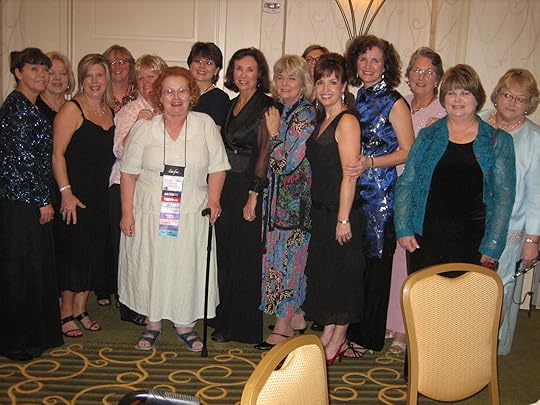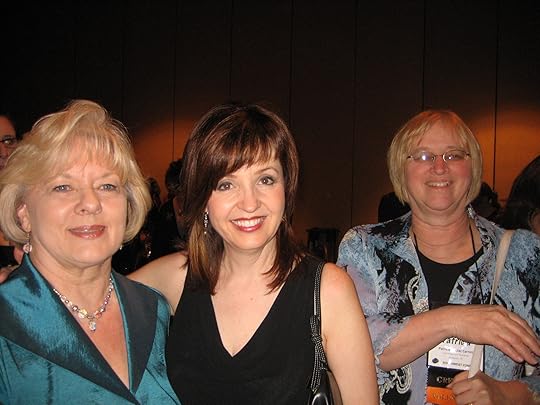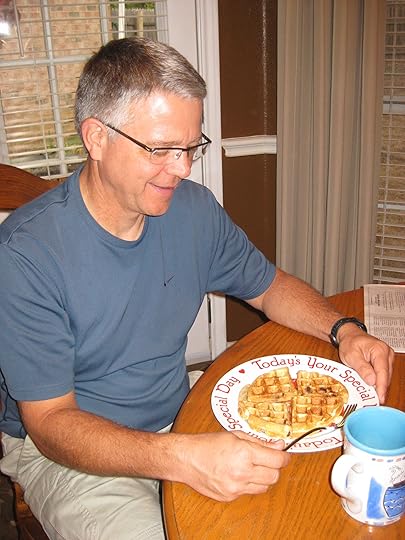Lynne Gentry's Blog, page 13
September 14, 2011
CHARACTER CHOICES
Here's a little teaching experiment I'm trying. Check out what Etta Mae Story has to say about giving your secondary characters choices.








September 13, 2011
REINVENT YOUR WRITING
Writing good stories is like raising good kids, they never happen by accident. Someone has

Heading off to ACFW to spend time with these wonderful writing friends.
to invest a lot of time and effort in the project to achieve an award-winning result.
How many times have you thought you'd written the next bestseller only to take it to your critique group meeting and have them mop the floor with you? I've done it more times than I can count. Yet, every Tuesday night I print out a chapter and set off for another grueling round of iron-sharpening-iron.
Why do I put myself through this torture?
The same reason actors perfer to rehearse in closed rehearsals. Their mistakes can be made in the safety of a learning environment.
Trusted writing partners have only my best interest at heart. I'd rather hear what's NOT working with my story in the comfort of someone's cozy living room than have the flaws plastered all over an Amazon review.
True writing friends are not here to tell me I'm wonderful. They're job is to make me a better writer. I'll admit, crits can sting. But I've learned to consider their points and to think through why something tripped them up. Their suggestions challenge me to ratchet up the tension here or find a fresh way to drive my point home there.
Are you writing in secret?
Don't do what I did. I wrote my first 400 page novel without letting anyone take a peek. When I finally summoned enough courage to submit the book to an editor, I received this terse response in eight minutes: I'm sorry, your writing does not measure up to the standards of our publishing house.
Ouch!
What did I learn? Don't submit another thing until you get some help, girlfriend. I needed a group that would challenge, yet encourage a pleaser like me to continue in this often brutal and solitary calling.
Fortunately, I found a constructive writing group. And humbly submitting to the process reinvented my writing.
When I consider what each of the members of our writing group bring to the table, I'm reminded of how women used to gather around a well or quilting frame. In the safety of that circle, they helped each other raise their families, withstand the hard times, and make the world a better place.
What if writers did the same today?

Janice Olson and Patty Carroll, two terrific writing buddies.








September 8, 2011
A Little Dab Will Do Ya
GUEST POST FRIDAY. Read what writer Jennifer Slattery has to say about the details of characterization.
I must have a very short, easily distractible attention span. Hand me a
newspaper and I'll have it read in ten minutes. Jennifer-read, that is. Which
means I'll skim the headlines, maybe glance at a few paragraph headings, check
out the photos and captions, and call it good. Then I let my imagination
take care of the rest. I find the images and scenarios created in my mind are
much more entertaining than the real life version. When I read a book, even
more so. I don't want to be given every detail of the forest as the heroine
hikes through it. I want to be given just enough to allow me to relive the
forest I hiked through as a child, or the forest I've always dreamed of
visiting. Basically, I want my imagination to be sparked, not dumped on.
A while back I was given a book to review slammed with details. Lots of
details. Every character was described, even the ones I met in passing, and
most of them were given very unusual traits. Seriously? Does every character
have an eagle like nose or elf ears and some sort of unusual gait? Honestly, I
started envisioning a side show and not the small town environment the author
tried to portray. And I did a lot of skimming. It's pretty sad when you can
skip large portions of a novel and still follow the story. Luckily the book got
better as I continued, but honestly, if I hadn't been reading it for a review
site, I probably would have tossed it aside after page two.
This is especially true in regard to characters. I'm not sure how other
writers do it, but characters fill my imagination long before they make it to
the page. I imagine my readers are similar. After reading a few details, and
seeing my characters in action, their minds have already formed a visual. As
writers, our goal, then, is to give enough details to trigger images, then
leave the rest to the imagination.
Knowing our details should be used purposefully ought to motivate us to
choose those that evoke strong, or telling, images. For example, if my heroine
is hiking through the forest and I want to convey a sense of peace or solitude,
I might focus on a gently flowing stream or a Blue Jay resting on a nearby
branch. If, however, my heroine is frightened, or lost, I'll focus on the
shadows caused by thickly clustered trees and the thorny, intertwining
blackberry bushes blocking the partially hidden trail.
The same goes for characterization. If my character is snootty and
superficial, I may focus on her nail polish, jewelry, or hair style. You would
be surprised how many other details your reader will fill in, especially if
descriptive dialogue and emotive action is added. Show them a lady with long,
painted nails and four-inch heels–ah, you're already picturing her, aren't you?
Okay, what if I add bleached blonde hair with black roots? A slightly different
picture, perhaps? How about a woman with long, painted nails with hair swept
back in a French roll? Given those details, do you really need to hear about
her pants, blouse, and purse or has your mind already filled in the rest?
And yet, at the same time, lack of details can sap the imagination just as
quickly as an overabundance of them can. One afternoon I read someone's work in
progress about a man who had fallen on some ledge that led him to a secret
passage. The author provided very little detail, and often in such general
terms, images weren't evoked. I heard there were jewels and stairs–in much that
way. What kind of jewels? What type of stone? The best piece of advice I
received in regard to details came from Ane Muligan, editor at Novel Rockets.
She said, always name it. Don't say a pleasant smell. Name the smell. Don't say
a tree. Name it. Oak? Elm? Palm?
Why don't you try it? Use details to help the reader paint a picture,
instead of painting the picture for them. I know you all like photographs, but
I'm not going to provide one. I'd rather you provide one for me!
Using your words. And remember, our visual image will be sparked by action,
description, and dialogue. Use all three to trigger (not overpower) the
reader's imagination.
First: An old man at the barber shop. That's all I'm going to say.
Second: A teen girl at a county fair.
Add your story as a comment. I can't wait to take an imagination vacation
with you!
Jennifer Slattery lives in the midwest with her husband of sixteen years and their

Jennifer Slattery
fourteen year old daughter. She lives in her head most of the time, but when visiting the real world, she likes to run, bike ride, and take long, romantic walks with her forever-love. She writes for Christ to the World Ministries, the Christian Pulse and Samie Sisters and is the marketing manager for the literary website, Clash of the Titles. Her writing has appeared in numerous publications, E-zines, and compilation books and has saturated the web many times over and placed in numerous contests. Now she uses her contest-winning skills to help other authors take their manuscripts from good to great. Find out more about her services at http://wordsthatkeep.wordpress.com and catch a devo or two at her personal blog, http://jenniferslatterylivesoutloud.com.








September 2, 2011
REINVENTING LONNIE
Show don't tell.
For a character to leap from the page, the successful author submits their character to a series of little choices that result in the BIG change or character arc.
Here's how it works:

Professor Lonnie's First Day of Teaching
My husband had been the lead pastor on large church staffs for nearly 30 years. When church politics ended his tenure at that church, what to do next seemed a very daunting question. Well, I could tell you that he is now an adjunct college professor. (See the smile on his first day of school pic?) In the telling, transitioning from a lead pastor to a college professor seems like one big happy choice.
Actually, an extended seires of small, painful choices facilitated Lonnie's reinvention.
Here's showing you the little choices:
Lonnie sent out resumes. He rested. He volunteered on the local bike trail. He sent out a few more resumes. He started a church. He thought about sending out more resumes. He felt God calling him another direction and quit sending resumes. Lonnie decided to work on the church plant and try to supplement our income teaching as an adjunct college professor.
Little choices + More little choices = BIG CHANGE.

First Day of School Breakfast








August 30, 2011
LIFE CHOICES
Life's a show. An unpredicatable production. We don't know how the story ends until the final curtain.
I'm amazed at how the series of seemingly insignificant choices I made in Act 1 of my life are now redirecting the action in Act 2. Makes me a little nervous about Act 3. But maybe I'll be so old by then I won't even remember Act. 1.
In the next few days, I'll be putting together that information I promised you on choices.
Meanwhile, here's a fun interview I did with writer Michelle Stimpson. Listen for the choices. You might even notice a pattern that I applied to Leona Harper.
Interview link (scroll down slightly and click on first yellow heart)
BUY NOW: Reinventing Leona at: Amazon, Barnes & Noble, CBD, or Mobipocket

BUY NOW at www.amazon.com








August 27, 2011
CHOICES

BUY NOW at www.amazon.com
BUY NOW: Reinventing Leona at: Amazon, Barnes & Noble, CBD, or Mobipocket
Behind the scenes, directors make a million choices: script, cast, costumes, feel of the show, lighting, blocking, sets, etc. But when the curtain goes up, the show appears to be the sum of one choice … whether or not to stage this particular show?
Choices assail us every day. Double whip frappuccino or unsweetened green tea? String the kids up by their ears or give them a kiss and let this crisis slide? Finish writing that novel we started or move on to something else? Curl up in despair or get up and try again?
I love to push the characters in my stories to the very edge of a serious choice then watch them squirm. It's even more fun to have them make a few wrong choices, have catastrophe hit, and watch them struggle to right themselves.
A writer friend asked me, why the fascination with choices?
Good question. I guess it's because I appreciate the freedom God has given us to choose. Part of me hates to get in trouble. I wish I could claim that this play-it-safe nature kept me from taking risks and making mistakes. But it doesn't. Why? I have an even bigger streak of rebellion in me which has racked up a long list of POOR choices.
Funny thing, God's been there through the good choices and the bad.
For the next few weeks, we're going to learn how to up the tension in our stories by examining the choices the characters had to make in Reinventing Leona.
I'll be anxious to know what you think. Wade in there … if you so choose.








July 20, 2011
Who Wants a Do-Over?
BUY Reinventing Leona at: Amazon, Barnes & Noble, CBD, or Mobipocket.

Available for immediate download
During a live stage performance, there's no such thing as a do-over. Unlike the chapters we write and rewrite, the stage actor can't say to the audience, "Sorry, I missed my cue. Can I start over?"
For stage actors, doing a scene over is reserved for only one place … rehearsal. Lots of them. Hours and hours of grueling practice. Hard work is the key to success for that one-and-only shot before a paying crowd.
Many times I've wished life was a film sound stage and I had a director who'd let me have several takes on every scene.
Maybe you've wished for the chance to do something over? A marriage? Parenting your children? Deciding whether or not to skip those college classes? Your driver's license renewal test?
What if those mistakes were dress rehearsals? Practice sessions? A second chance to get it right? Would you be willing to do the work for a perfect life performance?
Here's the bad news: You can't do enough hard work.
Here's the good news: You don't have to.
Someone else paid the price. You can start over free and clear because of the blood of Jesus Christ.
It's never too late to take advantage of a do-over deal like that.
Buy Reinventing Leona at: Amazon, Barnes & Noble, CBD, or Mobipocket.








July 4, 2011
It's Never Too Late to Start Over
a Tyndale House Publishers Digital First
July 2011 new release at:
Amazon, Barnes & Noble, CBD, or Mobipocket.

Available for immediate download
July 1, 2011 is a day of new beginnings for me. Today I transition from unpublished writer to published author. While I have been writing for many years and have published magazine articles and short stories, in a lot of ways getting a novel published is like starting over. This pastor's wife has so much to learn on the published side of this writing business.
Maybe you are in the process of starting over. Perhaps your marriage fell apart or your health took a dive or you lost a job you've had for thirty years. You know, then, how it feels to be rockin' along on your chosen path when suddenly you're forced to switch gears. I'd love to hear how God used a radical course redirection to reinvent you.
Watch the video then leave your story of starting over in the comment box below. There's a prize in it for the story of reinvention that captures my heart.
If you haven't bought Reinventing Leona, click here: Amazon, Barnes & Noble, CBD, or Mobipocket.








June 25, 2011
Ever wished YOU could REINVENT yourself?

Available for immediate download at www.amazon.com
Check out Reinventing Leona, a Tyndale House Publishers Digital First 2011 new release at: Amazon or Mobipocket.
Politicians and actors regularly transform their lives. Embarrassing situations are not career enders for them but rather opportunities to regroup, write a book, and come back even stronger.
Starting over seems simple enough … until the need to start over happens to us.
Why? Because radical change is difficult. We don't like it when unforeseen circumstances alter our plans. So we're tempted to take the route of least resistance and live safe, stagnant lives.
But despite all of our precautions, sooner or later something will rock our world. Whether it is the death of a loved one, the divorce of a spouse or the divorce of our parents, the loss of our job, a move, a betrayal, strained family relations, or a major illness … forced course redirections can cause a great deal of pain and suffering.
How we handle these stressful situations is as unique and individual as the characters in our books.
I watched three of my best friends suffer the loss of their husbands. Two of them regrouped, rebuilt, and reinvented their lives. One shriveled up and died in a nursing home. Observing these three different women handle the same situation caused me to ask one of the questions that always sparks a good story: what would I do if tragedy struck me? Do I have the spiritual chops to pick myself up and start over? Could I trust God to lead me through a dark valley?
My debut novel, Reinventing Leona, is a study in the resilience of the human spirit. People do get back on their feet … I'm living proof of that.
I invite you to consider what you're made of. If you had to reinvent yourself, would you curl up or get up?
Check out Reinventing Leona at Amazon or Mobipocket and let me know how God has used hard times to remake you.








June 10, 2011
Passive Writing = Passive Characters
Dallas stage costume designer, Eric Criner says "Bland costumes that blend into bland walls equal bland characters." So when Eric is considering how he's going to dress the leads, he looks for costume colors that pop against the background. He would never put a taupe dress on his heroine and stand her in front of a taupe wall. Dress her in red or black and she is the only thing the audience sees.
What do you want your audience of readers to "see" when they read the sentences you string together? Are the thoughts you're expressing bland or do they make the reader want to turn the page to know more?
Check out this great teaching video by my writing friend, Aggie Villanueva and find out how you can take a bland sentence structure, dress it in red, and tell a story that pops.
http://www.promotionalacarteblog.com/2011/05/eliminate-passive-writing-the-1st-word
Send me some of your rearranged and re-dressed sentences and I'll post them here.











